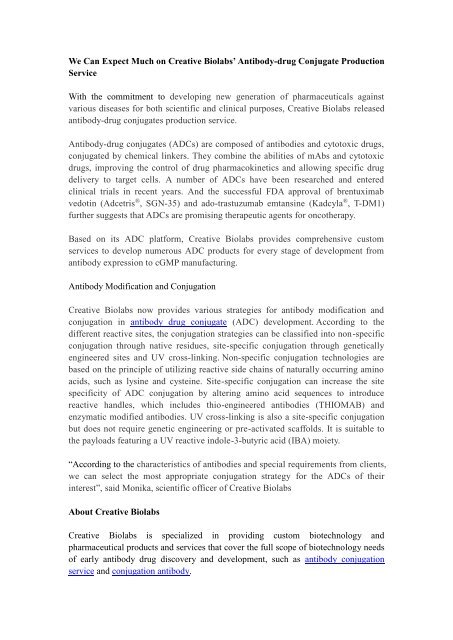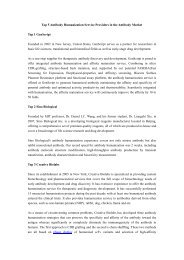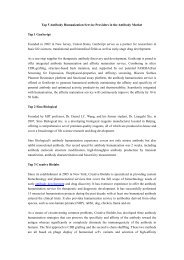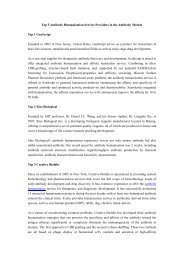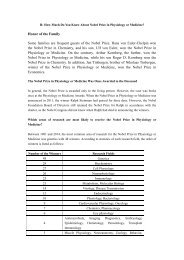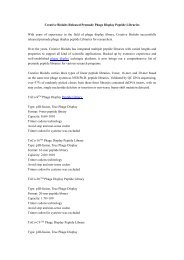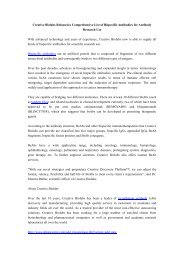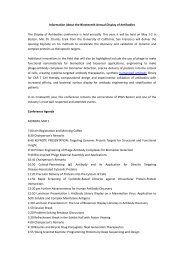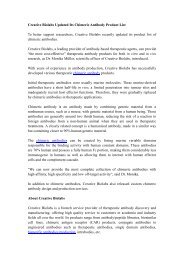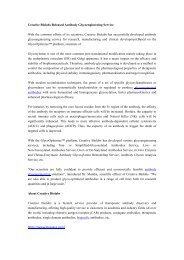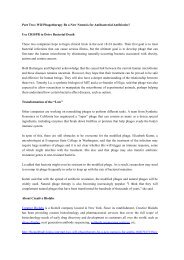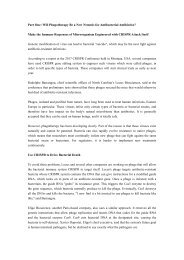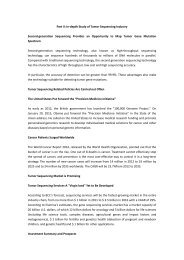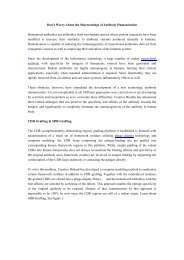Creative Biolabs Released Antibody-drug Conjugate Production Service for Antibody Engineering Research
Create successful ePaper yourself
Turn your PDF publications into a flip-book with our unique Google optimized e-Paper software.
We Can Expect Much on <strong>Creative</strong> <strong>Biolabs</strong>’ <strong>Antibody</strong>-<strong>drug</strong> <strong>Conjugate</strong> <strong>Production</strong><br />
<strong>Service</strong><br />
With the commitment to developing new generation of pharmaceuticals against<br />
various diseases <strong>for</strong> both scientific and clinical purposes, <strong>Creative</strong> <strong>Biolabs</strong> released<br />
antibody-<strong>drug</strong> conjugates production service.<br />
<strong>Antibody</strong>-<strong>drug</strong> conjugates (ADCs) are composed of antibodies and cytotoxic <strong>drug</strong>s,<br />
conjugated by chemical linkers. They combine the abilities of mAbs and cytotoxic<br />
<strong>drug</strong>s, improving the control of <strong>drug</strong> pharmacokinetics and allowing specific <strong>drug</strong><br />
delivery to target cells. A number of ADCs have been researched and entered<br />
clinical trials in recent years. And the successful FDA approval of brentuximab<br />
vedotin (Adcetris ® , SGN-35) and ado-trastuzumab emtansine (Kadcyla ® , T-DM1)<br />
further suggests that ADCs are promising therapeutic agents <strong>for</strong> oncotherapy.<br />
Based on its ADC plat<strong>for</strong>m, <strong>Creative</strong> <strong>Biolabs</strong> provides comprehensive custom<br />
services to develop numerous ADC products <strong>for</strong> every stage of development from<br />
antibody expression to cGMP manufacturing.<br />
<strong>Antibody</strong> Modification and Conjugation<br />
<strong>Creative</strong> <strong>Biolabs</strong> now provides various strategies <strong>for</strong> antibody modification and<br />
conjugation in antibody <strong>drug</strong> conjugate (ADC) development. According to the<br />
different reactive sites, the conjugation strategies can be classified into non-specific<br />
conjugation through native residues, site-specific conjugation through genetically<br />
engineered sites and UV cross-linking. Non-specific conjugation technologies are<br />
based on the principle of utilizing reactive side chains of naturally occurring amino<br />
acids, such as lysine and cysteine. Site-specific conjugation can increase the site<br />
specificity of ADC conjugation by altering amino acid sequences to introduce<br />
reactive handles, which includes thio-engineered antibodies (THIOMAB) and<br />
enzymatic modified antibodies. UV cross-linking is also a site-specific conjugation<br />
but does not require genetic engineering or pre-activated scaffolds. It is suitable to<br />
the payloads featuring a UV reactive indole-3-butyric acid (IBA) moiety.<br />
“According to the characteristics of antibodies and special requirements from clients,<br />
we can select the most appropriate conjugation strategy <strong>for</strong> the ADCs of their<br />
interest”, said Monika, scientific officer of <strong>Creative</strong> <strong>Biolabs</strong><br />
About <strong>Creative</strong> <strong>Biolabs</strong><br />
<strong>Creative</strong> <strong>Biolabs</strong> is specialized in providing custom biotechnology and<br />
pharmaceutical products and services that cover the full scope of biotechnology needs<br />
of early antibody <strong>drug</strong> discovery and development, such as antibody conjugation<br />
service and conjugation antibody.


